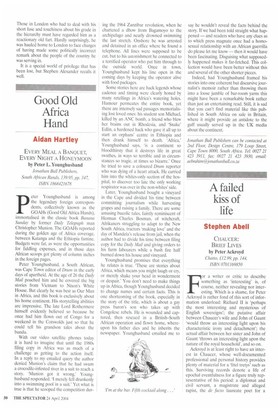Good Old Africa Hand
Aidan Hartley
EVERY MEAL A BANQUET, EVERY NIGHT A HONEYMOON by Peter L. Younghusband Jonathan Ball Publishers, South African Rands, 139.95, pp. 347. ISBN 1868421678 peter Younghusband is among the legendary foreign correspondents, collectively known as the GOAT-Is (Good Old Africa Hands), immortalised in the classic book Banana Sunday by former Daily Telegraph man Christopher Munion. The GOAHs reported during the golden age of Africa coverage, between Katanga and the Ethiopia famine. Budgets were fat, as were the opportunities for fiddling expenses, and in those days African scoops got plenty of column inches in the foreign pages. Peter Younghusband, a South African, was Cape Town editor of Drum in the early days of apartheid. At the age of 26 the Daily Mail poached him and he covered the big stories from Vietnam to Nixon's White House. But clearly he was best as Our Man in Africa, and this book is exclusively about his home continent. His storytelling abilities are impressive. The late Lord Rothermere himself evidently believed so because he once had him flown out of Congo for a weekend in the Cotswolds just so that he could tell his grandson tales about the bundu. With our video satellite phones today it is hard to imagine that until the 1980s filing copy in Africa was as much of a challenge as getting to the action itself. In a reply to my emailed query the author denied Munion's claim that he had swum a crocodile-infested river in a suit to reach a story. `Munion got it wrong,' Younghusband responded. 'I merely fell drunkenly into a swimming pool in a suit.' Yet what is true is that he scooped the competition dur ing the 1964 Zanzibar revolution, when he chartered a dhow from Bagamoyo to the archipelago and nearly drowned swimming the last stretch. Onshore he was arrested and detained in an office where he found a telephone. All lines were supposed to be cut, but to his astonishment he connected to a terrified operator who put him through to the outside world. Once in town, Younghusband kept his line open in the coming days by keeping the operator alive with food packages. Some stories here are hack legends whose cadence and timing were clearly honed by many retellings in Africa's watering holes. Humour permeates the entire book, yet there are intensely sad passages memorialising lost loved ones: his student son Michael, killed by an ANC bomb, a friend who blew her brains out in Rhodesia, and 'Snake' Edlin, a hardened hack who gave it all up to start an orphans' centre in Ethiopia and then drank himself to death. 'Africa,' Younghusband says, 'is a continent so bloodthirsty that it destroys life in great swathes, in ways so terrible and in circumstances so tragic, at times so bizarre.' Once he tried to save a coloured Drum reporter who was dying of a heart attack. He carried him into the whites-only section of the hospital, to discover too late the only working respirator was over in the non-whites' side. Later, Younghusband bought a vineyard in the Cape and divided his time between committing journalism while harvesting grapes and raising a family. There are some amusing bucolic tales, faintly reminiscent of Herman Charles Bosman, of witchcraft. Afrikaners struggling to adapt to the New South Africa, tractors 'making love' and the day of Mandela's release from jail, when the author had to divide his time between filing copy for the Daily Mail and giving orders to his farm labourers while a bush fire half burned down his house and vineyard. Younghusband promises that everything he relates is true. 'These are stories about Africa, which means you might laugh or cry, or merely shake your head in wonderment or despair.' You don't need to make things up in Africa, though Younghusband decided to change names and certain facts. This is one shortcoming of the book, especially in the story of the title, which is about a gay press baron's son who takes up with Congolese rebels. He is wounded and captured, then rescued in a British–South African operation and flown home, whereupon his father dies and he inherits the newspaper. Younghusband emailed me to say he wouldn't reveal the facts behind the story. If we had been told straight what happened — and readers who have any clues as to which press magnate once had a homosexual relationship with an African guerrilla do please let me know — then it would have been fascinating. Disguising what supposedly happened makes it far-fetched. This collection would have been better without this and several of the other shorter pieces. Indeed, had Younghusband framed his stories into one coherent but discursive journalist's memoir rather than throwing them into a loose jumble of bar-room yarns this might have been a remarkable book rather than just an entertaining read. Still, it is sad that you can't find material like this published in South Africa on sale in Britain, where it might provide an antidote to the guff usually served up in the UK media about the continent.
Jonathan Ball Publishers can be contacted at 2nd Floor, Design Centre, 179 Loop Street, Cape Town 8000, South Africa. TeL 0027 21 423 3911, far 0027 21 423 3930, email: aebrahim@jonathanball.co.za


















































































 Previous page
Previous page